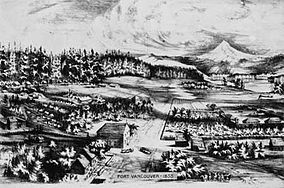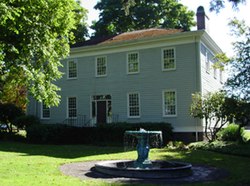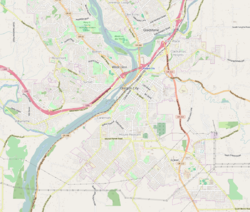Fort Vancouver National Historic Site
| Fort Vancouver National Historic Site | |
|---|---|
|
IUCN category V (protected landscape/seascape)
|
|

Illustration of Fort Vancouver and its environs in 1855.
|
|
| Location | Vancouver, Washington and Oregon City, Oregon, USA |
| Nearest city |
Vancouver, Washington, and Oregon City, Oregon |
| Coordinates | 45°37′31″N 122°39′29″W / 45.6253950°N 122.6581525°WCoordinates: 45°37′31″N 122°39′29″W / 45.6253950°N 122.6581525°W |
| Area | 207 acres (84 ha) |
| Established | June 19, 1948 (national monument) June 30, 1961 (national historic site) |
| Visitors | 710,439 (in 2011) |
| Governing body | National Park Service |
| Website | Fort Vancouver National Historic Site |
|
McLoughlin House National Historic Site
|
|
 |
|
| Location | McLoughlin Park, between 7th and 8th Sts., Oregon City, Oregon |
|---|---|
| Coordinates | 45°21′26″N 122°36′21″W / 45.35722°N 122.60583°W |
| Area | 0.6 acres (0.24 ha) |
| Built | 1845 |
| NRHP Reference # | 66000637 |
| Significant dates | |
| Added to NRHP | October 15, 1966 |
| Designated NHS | 1941 |
Fort Vancouver National Historic Site is a United States National Historic Site located in the states of Washington and Oregon. The National Historic Site consists of two units, one located on the site of Fort Vancouver in modern-day Vancouver, Washington; the other being the former residence of John McLoughlin in Oregon City, Oregon. The two sites were separately given national historic designation in the 1940s. The Fort Vancouver unit was designated a National Historic Site in 1961, and was combined with the McLoughlin House into a unit in 2003.
The main unit of the site, containing Fort Vancouver, is located in Vancouver, Washington, just north of Portland, Oregon. Fort Vancouver was an important Hudson's Bay Company fur trading post that was established in 1824. Operations until 1845 were overseen by Chief Factor John McLoughlin. It was the center of HBC activity on the Pacific coast and its influence stretched from the Rocky mountains in the east, to Alaska in the north, Alta California in the south, and to the Kingdom of Hawaii in the Pacific. Ratified in 1846, the Treaty of Oregon was signed by the United Kingdom of Great Britain and Ireland and the United States, thereby ending the decades long Oregon boundary dispute. The treaty permitted the HBC to continue to operate at Fort Vancouver, which was now within the Oregon Territory. On June 14, 1860, Fort Vancouver was abandoned by the HBC in favor of their stations in British Columbia, such as Fort Victoria.
...
Wikipedia



